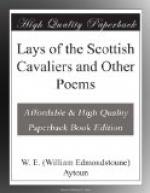When we look at the portrait of Claverhouse, and survey the calm, melancholy, and beautiful features of the devoted soldier, it appears almost incredible that he should ever have suffered under such an overwhelming load of misrepresentation. But when—discarding modern historians, who in too many instances do not seem to entertain the slightest scruple in dealing with the memory of the dead—we turn to the writings of his contemporaries who knew the man, his character appears in a very different light. They describe him as one who was stainless in his honour, pure in his faith, wise in council, resolute in action, and utterly free from that selfishness which disgraced the Scottish statesmen of the time. No one dares question his loyalty, for he sealed that confession with his blood; and it is universally admitted, that with him fell the last hopes of the reinstatement of the house of Stuart.
I may perhaps be permitted here, in the absence of a better chronicler, to mention a few particulars of his life, which, I believe, are comparatively unknown. John Graham of Claverhouse was a cadet of the family of Fintrie, connected by intermarriage with the blood-royal of Scotland. After completing his studies at the University of St. Andrew’s, he entered, as was the national custom for gentlemen of good birth and limited means, into foreign service, served some time in France as a volunteer, and afterwards went to Holland. He very soon received a commission, as a cornet in a regiment of horse-guards, from the Prince of Orange, nephew of Charles II. and James VII., and who afterwards married the Princess Mary. His manner at that time is thus described:—“He was then ane esquire, under the title of John Graham of Claverhouse; but the vivacity of his parts, and the delicacy and justice of his understanding and judgment, joyned with a certain vigour of mind and activity of body, distinguished him in such a manner from all others of his rank, that though he lived in a superior character, yet he acquired the love and esteem of all his equals, as well as of those who had the advantage of him in dignity and estate.”




